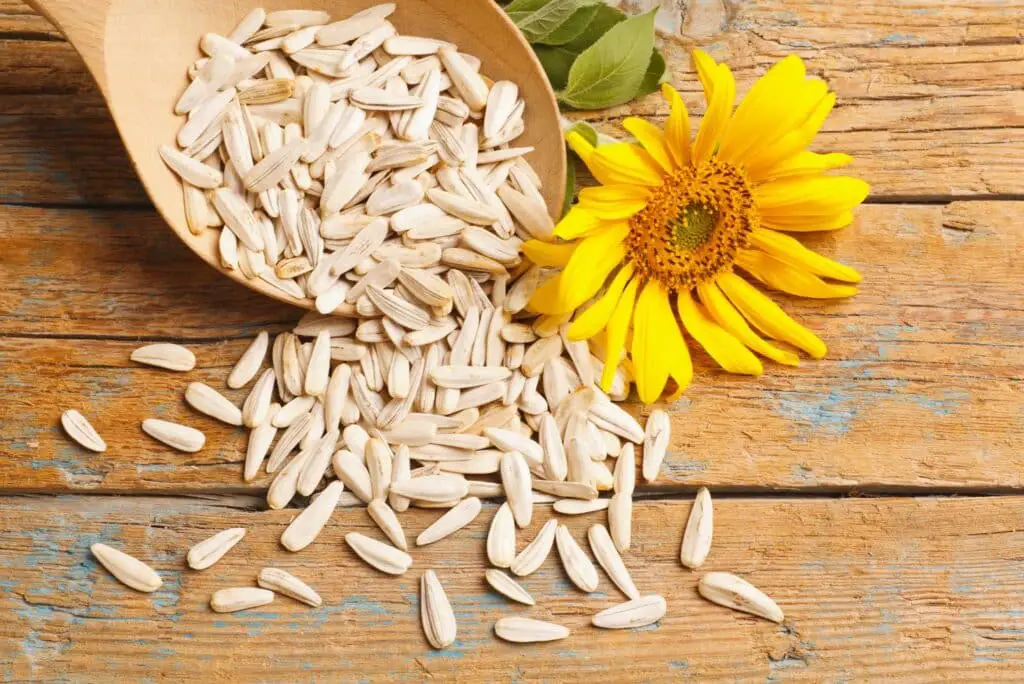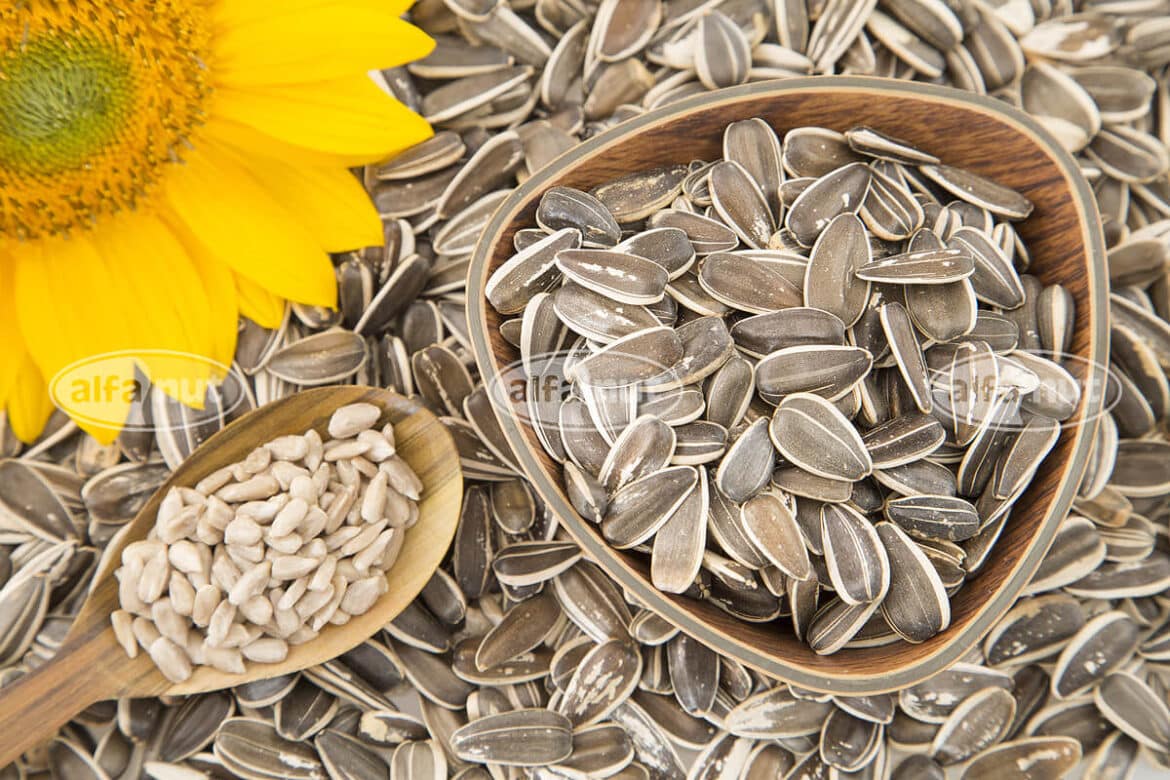Introduction
Are Sunflower Seeds Good For Weight Loss: In the ever-evolving landscape of health and nutrition, the quest for effective weight loss strategies remains a top priority for many individuals. Among the plethora of dietary choices available, one often overlooked option is sunflower seeds. These unassuming little seeds, often found nestled within the vibrant blooms of sunflowers, possess a surprising array of qualities that may contribute to weight loss. In this exploration, we will delve into the nutritional profile of sunflower seeds, their potential role in appetite control, and their place in a balanced diet, shedding light on whether sunflower seeds can indeed be a valuable ally in the journey towards achieving and maintaining a healthy weight. So, let’s uncover the secrets hidden within these tiny kernels and determine whether sunflower seeds are a worthy addition to your weight loss regimen.
Sunflower seeds are packed with essential vitamins and minerals, such as vitamin E, magnesium, and selenium. These nutrients support overall health and can make it easier to stick to a balanced diet while trying to lose weight. It’s important to note that sunflower seeds are calorie-dense, so portion control is key. Consuming them in moderation as part of a balanced diet is crucial to avoid excess calorie intake.
Sunflower seeds are incredibly versatile and can be incorporated into a variety of dishes. You can sprinkle them on salads, yogurt, or oatmeal, or use them as a crunchy topping for various recipes. This versatility makes it easier to include them in your daily meals and snacks.

Does sunflower seed reduce weight?
Sunflower seeds are rich in proteins and fibre. They make us feel full for a long time, reduce our food intake and finally reduce the number of calories consumed. This helps in reduction of weight.
The Nutritional Profile of Sunflower Seeds
Sunflower seeds, the edible seeds harvested from sunflowers, possess a nutritional profile that may contribute to weight loss efforts. They are a rich source of several key nutrients:
Protein: Sunflower seeds are notably protein-rich, with about 5-6 grams of protein per ounce. Protein is essential for maintaining and building lean muscle mass, which can boost metabolism and contribute to a sense of fullness, potentially reducing overall calorie intake.
Healthy Fats: These seeds contain predominantly unsaturated fats, including monounsaturated and polyunsaturated fats. These healthy fats can support heart health and promote a feeling of satiety, reducing the temptation to consume high-calorie snacks.
Dietary Fiber: Sunflower seeds are a good source of dietary fiber, with approximately 3-4 grams per ounce. Fiber aids in digestion and can help control appetite by creating a sense of fullness.
Essential Vitamins and Minerals: Sunflower seeds provide essential nutrients such as vitamin E, magnesium, and selenium, which play various roles in overall health.
How Sunflower Seeds May Contribute to Weight Loss
Satiety: The combination of protein, healthy fats, and fiber in sunflower seeds can help promote a feeling of fullness. This can lead to reduced calorie consumption and better appetite control, aiding in weight loss efforts.
Blood Sugar Regulation: The protein and fiber content in sunflower seeds can help stabilize blood sugar levels, reducing energy crashes and cravings for sugary, high-calorie foods.
Nutrient Density: Sunflower seeds offer a wide range of essential nutrients without an excessive calorie load. This nutrient density supports overall health while aligning with a weight loss plan.
Is it OK to eat sunflower seeds everyday?
Therefore, you shouldn’t worry about eating reasonable amounts of sunflower seeds, such as 1 ounce (30 grams) per day — but you shouldn’t eat a bagful in a day.
The Nutritional Benefits of Sunflower Seeds
Protein: Sunflower seeds are a notable source of plant-based protein, which is essential for various bodily functions, including muscle maintenance, immune support, and hormone production.
Healthy Fats: These seeds contain predominantly unsaturated fats, particularly monounsaturated and polyunsaturated fats, which are heart-healthy and contribute to overall well-being.
Fiber: Sunflower seeds are a good source of dietary fiber, aiding in digestion and promoting a feeling of fullness, which can assist in weight management.
Vitamins and Minerals: They are rich in essential nutrients such as vitamin E, magnesium, selenium, and folate, all of which play vital roles in maintaining good health.
The Advantages of Regular Consumption
Nutrient Intake: Consuming sunflower seeds regularly can ensure a steady intake of essential nutrients that support various bodily functions.
Satiety: The combination of protein and fiber in sunflower seeds can help you feel full and satisfied, potentially reducing overall calorie intake.
Heart Health: The healthy fats and antioxidants in sunflower seeds are associated with cardiovascular benefits, including reduced risk factors for heart disease.
sunflower seeds high in fat?
Sunflower seeds are rich in nutrients. One serving of shelled sunflower seeds is usually an ounce, which is about 1/4 cup or 4 tablespoons (one to two thumb-sized portions.) They’re particularly high in healthy fat: A serving delivers 14 grams of fat with a mix of monounsaturated and polyunsaturated fats.
Fat Content in Sunflower Seeds
Unsaturated Fat: Sunflower seeds are predominantly composed of unsaturated fats, including monounsaturated and polyunsaturated fats. These fats are considered heart-healthy and can have various health benefits, such as reducing the risk of cardiovascular diseases.
Saturated Fat: While sunflower seeds contain a small amount of saturated fat, it is significantly lower compared to unsaturated fat. Saturated fat, when consumed in excess, can contribute to elevated cholesterol levels and increase the risk of heart disease.
The Healthy Aspects of Sunflower Seed Fat
Monounsaturated Fat: Monounsaturated fats, found in foods like sunflower seeds, can help reduce harmful LDL cholesterol levels while preserving or even increasing beneficial HDL cholesterol levels. This can contribute to better heart health.
Polyunsaturated Fat: Sunflower seeds are rich in polyunsaturated fats, particularly linoleic acid, which is an essential omega-6 fatty acid. Omega-6 fatty acids play a crucial role in maintaining overall health, including skin, hair, and cell function.
Omega-3 Fatty Acids: While sunflower seeds are not as high in omega-3 fatty acids as some other seeds like flaxseeds or chia seeds, they do contain a small amount of these essential fats, which also have heart-healthy properties.
How many sunflower seeds should I eat a day?
While sunflower seeds are rich in nutrients, they’re also relatively high in calories. It’s important to keep servings to a quarter cup at a time. In order to slow the caloric intake while snacking, many eat the seeds in the shell, as it takes time to crack open and spit out each shell.
Caloric and Fat Content
Sunflower seeds are calorie-dense due to their fat content. A typical one-ounce (28-gram) serving of sunflower seeds contains approximately 160-180 calories, with the majority of those calories coming from fats, specifically healthy unsaturated fats.
Recommended Daily Intake
Moderation: As with any calorie-dense food, moderation is key. A small handful or approximately one ounce (about two tablespoons) of sunflower seeds can be a reasonable daily portion for most adults.
Caloric Needs: Your daily calorie needs will dictate how many sunflower seeds you can include in your diet without exceeding your calorie intake goals. If you’re trying to maintain or lose weight, it’s essential to monitor your overall calorie consumption, including snacks like sunflower seeds.
Are almonds good for weight loss?
A review of 64 clinical trials and 14 meta-analyses reported that almonds were the only nut that showed a small but significant reduction in body weight and fat mass ( 38 ). Another study including 100 overweight women found that those consuming almonds lost more weight than those on a nut-free diet.
Nutritional Profile of Almonds
Healthy Fats: Almonds are rich in monounsaturated and polyunsaturated fats, often referred to as “good fats.” These fats can help reduce the risk of heart disease and may support satiety.
Protein: Almonds are a source of plant-based protein, which can contribute to feelings of fullness and assist in muscle maintenance and repair.
Dietary Fiber: Almonds are an excellent source of dietary fiber, promoting digestive health and providing a sense of satiety that can curb overeating.
Vitamins and Minerals: Almonds are a good source of essential nutrients, including vitamin E, magnesium, and biotin, which contribute to overall well-being.
The Potential Benefits for Weight Loss
Satiety: The combination of healthy fats, protein, and fiber in almonds can help you feel full and satisfied. This can potentially reduce overall calorie intake and minimize the urge to snack on less nutritious options.
Blood Sugar Control: Almonds have a low glycemic index, meaning they have a relatively mild impact on blood sugar levels. This can help prevent energy crashes and cravings for sugary, high-calorie foods.
Metabolism: Some research suggests that the monounsaturated fats in almonds may have a positive effect on metabolism, potentially aiding in weight loss efforts.
Can I eat 100g of sunflower seeds a day?
There are 538 calories per 100 grams of a product. But sunflower seeds don’t have cholesterol. They are even recommended to be included in the diet to compensate beneficial fats in the body. But don’t eat too much, just 20-30 grams a day.
Caloric and Fat Content
One of the primary considerations when consuming a substantial amount of sunflower seeds is the calorie and fat content. Sunflower seeds are calorie-dense due to their fat content, and 100 grams of sunflower seeds contain approximately 584 calories and 51 grams of fat. The majority of these fats are healthy monounsaturated and polyunsaturated fats, but it’s crucial to be mindful of your overall calorie intake, especially if you are watching your weight.
Nutritional Benefits
Protein: About 20 grams of protein, which supports muscle maintenance and overall bodily functions.
Dietary Fiber: Approximately 10 grams of dietary fiber, aiding digestion and promoting a sense of fullness.
Vitamins and Minerals: Rich in vitamin E, magnesium, selenium, and other essential nutrients contributing to overall health.
Are sunflower seeds junk food?
Sunflower seeds can be part of a healthy diet when eaten in moderation and in place of higher-calorie, unhealthy snacks. Keep in mind that many processed sunflower seeds are loaded with salt. Too much salt in your diet is tough on your heart and kidneys.
Nutritional Profile of Sunflower Seeds
Healthy Fats: Sunflower seeds are rich in monounsaturated and polyunsaturated fats, often referred to as “good fats.” These fats can support heart health and overall well-being.
Protein: They are a source of plant-based protein, which is essential for muscle maintenance and various bodily functions.
Dietary Fiber: Sunflower seeds are an excellent source of dietary fiber, which aids in digestion and contributes to feelings of fullness.
Vitamins and Minerals: They provide essential nutrients such as vitamin E, magnesium, selenium, and folate.
Factors That Influence Their Classification
Preparation and Flavoring: Sunflower seeds can be found in various forms, including raw, roasted, salted, flavored, and even as ingredients in processed foods like snack mixes. The nutritional profile of sunflower seeds can change significantly based on how they are prepared and seasoned.
Portion Control: Consuming sunflower seeds in moderation, as part of a balanced diet, can be a nutritious choice. However, excessive consumption can lead to excessive calorie and fat intake, potentially contributing to weight gain.
Dietary Goals: Whether sunflower seeds are considered junk food or not can depend on your dietary goals. If you are following a health-conscious diet and incorporating sunflower seeds as a snack or ingredient in your meals, they can contribute positively to your nutrient intake.
When should I eat sunflower seeds morning or night?
You can eat seeds on an empty stomach or you can drink it right in the morning. You can have in between the meals or mix it with a yoghurt. But if you are on a weight loss journey, the best time to have seeds is on an empty stomach.
Morning Consumption
Energy Boost: Eating sunflower seeds in the morning can provide an energy boost, thanks to their mix of healthy fats, protein, and dietary fiber. This can help kickstart your day and keep you feeling full until your next meal.
Nutrient Absorption: Consuming sunflower seeds in the morning may allow your body to better absorb the nutrients they offer, as your metabolism tends to be more active during the day.
Pre-Workout Snack: If you exercise in the morning, sunflower seeds can be a convenient and nutritious pre-workout snack. They provide a source of sustained energy and can help fuel your workout.
Breakfast Component: You can incorporate sunflower seeds into your breakfast routine by adding them to yogurt, oatmeal, or smoothies for extra texture and flavor.
Nighttime Consumption
Satiety: Eating sunflower seeds at night may help you feel full and satisfied, potentially reducing the urge to snack on less healthy options before bedtime.
Relaxation: For some people, the act of snacking on sunflower seeds in the evening can be a relaxing and enjoyable activity, helping them wind down before sleep.
Fiber for Digestion: The dietary fiber in sunflower seeds can support digestion, which can be particularly beneficial if you’ve had a meal earlier in the evening.

Conclusion
Sunflower seeds can indeed be a valuable asset on the journey towards weight loss and better overall health. Their rich nutritional profile, comprising protein, healthy fats, and dietary fiber, offers a range of benefits for those seeking to shed extra pounds. These tiny kernels can help promote satiety, stabilize blood sugar levels, and reduce cravings, making it easier to control calorie intake. Moreover, the array of essential vitamins and minerals they provide supports overall well-being.
However, it’s crucial to emphasize moderation when incorporating sunflower seeds into your diet, as they are calorie-dense. While they can aid in weight loss efforts, they should be part of a balanced and mindful eating plan. A holistic approach to weight management, including regular physical activity and a well-rounded diet, remains the most effective strategy. Therefore, when utilized wisely, sunflower seeds can be a valuable ally in your quest for a healthier weight and a more vibrant lifestyle.

